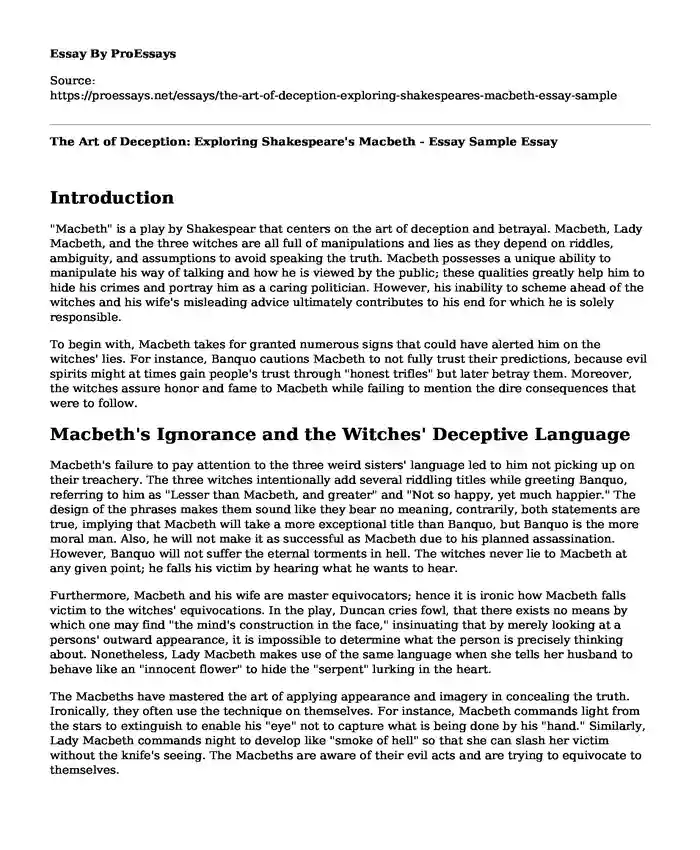Introduction
"Macbeth" is a play by Shakespear that centers on the art of deception and betrayal. Macbeth, Lady Macbeth, and the three witches are all full of manipulations and lies as they depend on riddles, ambiguity, and assumptions to avoid speaking the truth. Macbeth possesses a unique ability to manipulate his way of talking and how he is viewed by the public; these qualities greatly help him to hide his crimes and portray him as a caring politician. However, his inability to scheme ahead of the witches and his wife's misleading advice ultimately contributes to his end for which he is solely responsible.
To begin with, Macbeth takes for granted numerous signs that could have alerted him on the witches' lies. For instance, Banquo cautions Macbeth to not fully trust their predictions, because evil spirits might at times gain people's trust through "honest trifles" but later betray them. Moreover, the witches assure honor and fame to Macbeth while failing to mention the dire consequences that were to follow.
Macbeth's Ignorance and the Witches' Deceptive Language
Macbeth's failure to pay attention to the three weird sisters' language led to him not picking up on their treachery. The three witches intentionally add several riddling titles while greeting Banquo, referring to him as "Lesser than Macbeth, and greater" and "Not so happy, yet much happier." The design of the phrases makes them sound like they bear no meaning, contrarily, both statements are true, implying that Macbeth will take a more exceptional title than Banquo, but Banquo is the more moral man. Also, he will not make it as successful as Macbeth due to his planned assassination. However, Banquo will not suffer the eternal torments in hell. The witches never lie to Macbeth at any given point; he falls his victim by hearing what he wants to hear.
Furthermore, Macbeth and his wife are master equivocators; hence it is ironic how Macbeth falls victim to the witches' equivocations. In the play, Duncan cries fowl, that there exists no means by which one may find "the mind's construction in the face," insinuating that by merely looking at a persons' outward appearance, it is impossible to determine what the person is precisely thinking about. Nonetheless, Lady Macbeth makes use of the same language when she tells her husband to behave like an "innocent flower" to hide the "serpent" lurking in the heart.
The Macbeths have mastered the art of applying appearance and imagery in concealing the truth. Ironically, they often use the technique on themselves. For instance, Macbeth commands light from the stars to extinguish to enable his "eye" not to capture what is being done by his "hand." Similarly, Lady Macbeth commands night to develop like "smoke of hell" so that she can slash her victim without the knife's seeing. The Macbeths are aware of their evil acts and are trying to equivocate to themselves.
Conclusion
In conclusion, Macbeth carried out his evil desires without being misled by either his wife or the three witches. From the play, it is clear that Macbeth chose what to listen to and that not to listen to hence knowingly ignoring crucial information being hinted by Lady Macbeth and the three witches. Moreover, as a master equivocator, Macbeth could tell when and how he was being equivocated; thus, he was not supposed to fall into the traps.
Work Cited
"Macbeth: Entire Play." Shakespeare.Mit.Edu, 2020, retrieved from http://shakespeare.mit.edu/macbeth/full.html.
Cite this page
The Art of Deception: Exploring Shakespeare's Macbeth - Essay Sample. (2023, May 02). Retrieved from https://proessays.net/essays/the-art-of-deception-exploring-shakespeares-macbeth-essay-sample
If you are the original author of this essay and no longer wish to have it published on the ProEssays website, please click below to request its removal:
- Literary Analysis Essay on Danger for Odysseus
- The Great Gatsby is One of America's Greatest Novel: Literary Analysis Essay
- Book Review: Small Great Things by Jodi Picoult
- Suffering Breeds in Wisdom: King Lear Essay
- Literary Analysis Essay on "Girl", "Bullet in the Brain" and "A Clean, Well-Lighted Place"
- Essay on Frankenstein Experiment: Challenge on Ethics and Morality
- Sir Thomas Wyatt's Love Poems: Heartache & Loyalty - Essay Sample







